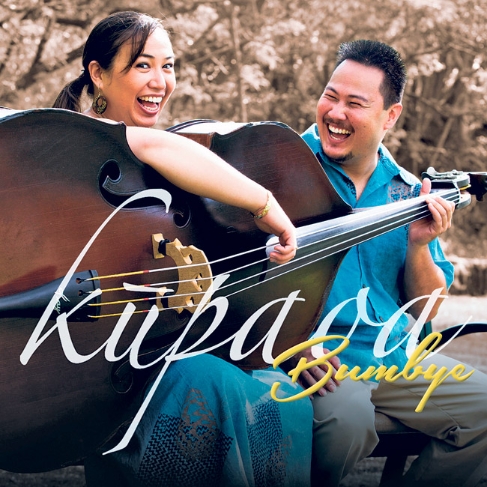Here and Now
With their latest album Bumbye, the ever-hustling members of Kupaoa demonstrate why good music should never be put off for another day
If Kellen and Lihau Hannahs Paik seem to be in a hurry these days, it’s only because they’ve got a thousand things to do – including fitting this interview into their hectic schedule while moving house and, in Lihau’s case, preparing for the weekend’s Merrie Monarch Festival – and so little time to accomplish them.
Such is life for the Paiks, collectively known as Kupaoa, the multi-Na Hoku Hanohano award-winning duet, with fans both here and abroad clamoring for ever more original and cover songs, ever more live performances from traditional Hawaiian music’s premier husband-and-wife team.
And to their credit, the couple haven’t shrunk from the constant demands of their growing fame. With the release of their third CD, Bumbye, these full-time musicians are demonstrating the importance of handling their full plate of affairs with immediacy rather than, as the album’s pidgin name and title track suggest, “eventually and possibly never.” Indeed, within the couple’s new walls (they now split time between their Kaimuki and Kilauea, Kauai, homes), procrastination has effectively been shown the door.
“The idea with the album’s name and song is that if you don’t take care of things now, there might not be a later on,” explains Lihau, who, aside from sharing singing duties with Kellen and playing the upright bass, handles the business side of Kupaoa. “So, even though we’re living life to maximum capacity right now, we’re taking care of things. And even though the song wasn’t written for us, we’re living the message.”
The song Bumbye, along with two others (Noelanioko’olau and Ka Waiwai), were penned by noted composer Puakea Nogelmeier, the couple’s kumu, alaka’i and, according to Lihau, “one of our biggest supporters since the very beginning.”
“He’s just an amazing songwriter,” adds Kellen, who, aside from playing the guitar and ukulele serves as the group’s music director and arranger. “We have such a good relationship with Puakea that we’ll often go to his home, kanikapila with him, and he’ll simply share his songs with us.”
Nogelmeier’s exemplary contributions aside, Bumbye also proves the Paiks are no songwriting slouches either. In the album’s first track, He Aloha Ka’upulehu, and on other compositions such as Pua Maria and Pakalana A Ka Pu’uwai, written for Lihau’s maternal grandmother, the Kupaoa members show off their ever-expanding skills as poignant singer-songwriters, and demonstrate why traditional Hawaiian music lovers adore their sound – as much for their beautifully blended harmonies as for their clean acoustic arrangements.
Thank goodness Kellen decided to recruit Lihau, then a college acquaintance, to perform at a friend’s wedding eight years ago. That invitation led to the group’s formation, which produced albums Pili O Ke Ao and English Rose, and, more importantly, Kellen and Lihau’s eventual marriage in 2010.
“We practiced for a whole year before Kellen’s friend’s wedding,” recalls Lihau. “It was good; I sang a little, mostly danced the hula, but I didn’t play an instrument. I asked my brother (Kale Hannahs of Waipuna, last year’s big Na Hoku Hanohano winners) to teach me, but he told me ‘no.’ He probably did that to save our relationship. So Kellen had to show me how to play the bass.”
“And with me,” continues Kellen, “I played instruments, but I had to learn to sing. But from the moment Lihau and I first sang together, our voices just blended together well.”
“We certainly didn’t expect to make a living as musicians,” Lihau adds. “But we’ve been fortunate to turn this passion of ours into something good and make a career out of it.”
Here’s what else Kupaoa – which celebrates its CD release party this Friday at its weekly gig spot, The Corner Kitchen in Kaimuki, before embarking on a near-monthlong tour of Japan – told Musical Notes:
MN: You recently moved out of your Aina Haina home, where you recorded your last two albums. What are you going to remember most about those days and nights of laying tracks down in the confines of that home?
KP: Mostly that there was no AC and it would often reach 100 degrees inside. But we’d still sit there in our underwear and just sweat it out recording our music. It wasn’t glamorous, but it worked.
MN: What was the idea behind your online-only album Haliu Volume One, which features traditional Hawaiian favorites as Green Rose Hula, ‘Alekoki, Tewetewe and Paniau – the latter of which was recorded with a turntable’s distinctive crackling noise, giving the track an authentic old-time feel?
LP: We really love country and folk music. But for us, Hawaiian music is a true passion so …
KP: … because we didn’t want our fans to think we sold out with some of the songs we have on our other albums, we recorded 15 older Hawaiian songs – none of which were originals or instrumentals, but all of them were done with the hula in mind. Basically, those songs were done for us and make up Haliu. Our feeling was that in order to put out new music, you have to have a foundation in the older songs.






